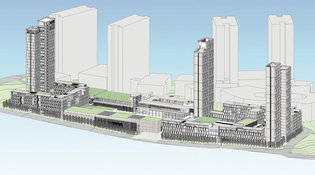 loading
loading
Light & VeritySingapore college deal is made official Office of Public AffairsAn architect's rendering shows the three residential colleges and central courtyard of Yale-NUS College. View full image
Stone carvers and sweatshirt makers take note: the founding date of Yale-NUS College was April 11, 2011. On that date, officials at Yale and the National University of Singapore signed an agreement creating the first liberal arts college in Singapore and one of the first in Asia. The college will admit its first 150 students in the fall of 2013. For NUS, the venture will add to a collection of joint ventures with American universities as Singapore tries to position itself as the intellectual center of Asia. For Yale, the college is intended to increase the university’s prestige and visibility in Asia as that region rises in influence—and to be a kind of workshop for rethinking what a liberal arts curriculum might look like if conceived from scratch in a global context. And although it’s not exactly a branch campus, the college will be Yale’s first major foray into undergraduate education outside New Haven. Yale astronomy professor Charles Bailyn ’81, who has been involved in curriculum planning for the college and has been named its first dean of faculty, says the plan for the college is largely the same as outlined last fall (see “Singapore Spinoff,”November/December 2010): an eventual enrollment of about a thousand students, drawn largely from Singapore and other Asian countries; a core curriculum that brings in both Western and Asian perspectives; a faculty of about 100 people recruited from around the world specifically to teach in the college; and a residential college system like Yale’s. Degrees from the college will be granted by NUS, not Yale, and the Singaporean government will fund the venture. Critics of the plan have raised both moral and practical questions about Yale’s involvement with a nation where the longtime ruling political party suppresses public assembly and punishes critics of the government with criminal libel laws. Yale officials continue to argue, though, that it will be possible for students and faculty to work and learn effectively in Singapore. “Academic discourse on the campus of the National University of Singapore is open and unconstrained,” says Yale president Richard Levin ’74PhD, “and we expect that the openness of conversation in the classrooms and on the campus of the new college will be no different than it is here in New Haven.” Provost Peter Salovey ’86PhD adds that “guarantees of academic freedom and nondiscrimination” are written into the agreement and that a standing committee of faculty from both Yale and NUS will “help bridge cultures and address differences in practices.” After the deal was announced in March, Yale professor Christopher Miller ’83PhD, a former chair of the French department, wrote an op-ed for the Yale Daily News arguing that Yale should not go forward with the plan as long as homosexual acts are illegal in Singapore. In response, Salovey notes that the government has said publicly that its anti-gay law is no longer being enforced in the nation. At the signing in April, the design for the campus of the new college was unveiled. Occupying part of a former golf course adjacent to NUS’s main campus, Yale-NUS will consist of a central courtyard flanked by a main library, performing arts facilities, and administrative offices; and three residential colleges arranged around courtyards. Much of the student housing will be in high-rises, but planners are dividing the towers into three-story modules to create smaller communities as college entryways do at Yale. The new campus won’t be completed until 2014, so the first year’s students will be housed elsewhere on the NUS campus. As work on the physical campus continues, design of the Yale-NUS curriculum will develop over the next two years as faculty are hired. Bailyn says a “full-out” faculty search will begin this fall, and that a “significant fraction of the faculty will be in place by next fall”—that is, 2012. Those professors will come to New Haven for the 2012–13 academic year to work together on the new curriculum.
The comment period has expired.
|
|